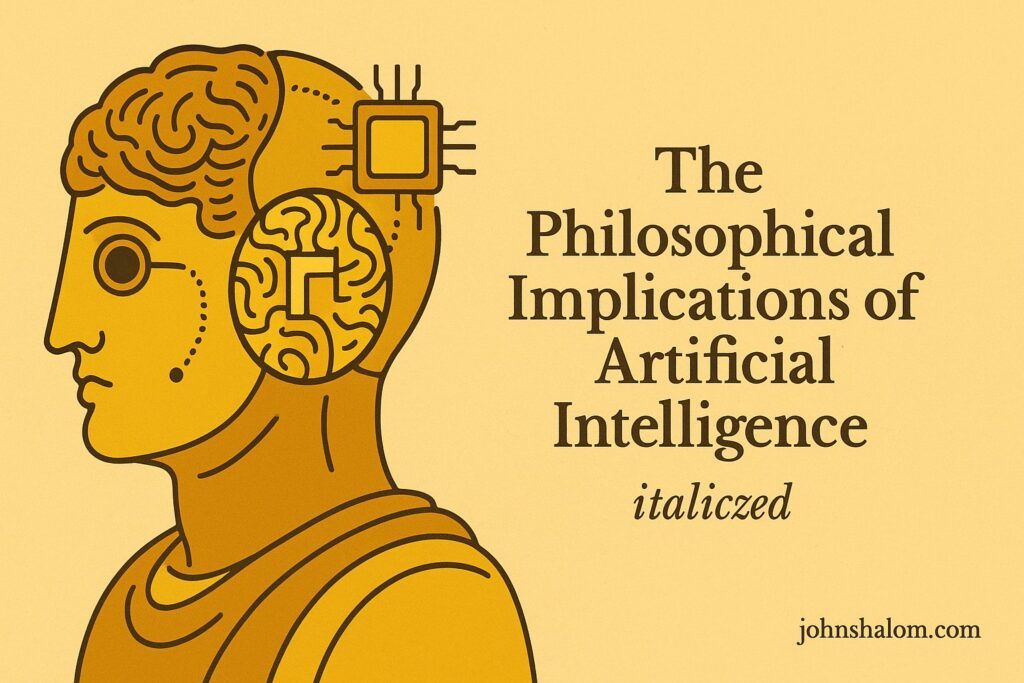
TL;DR:
Artificial intelligence isn’t just reshaping technology—it’s reshaping how we define ourselves. These reflections taught me that the real question isn’t “Can machines think?” but “What does thinking mean?” As AI grows smarter, humanity must grow wiser. Philosophy keeps us grounded while the code keeps evolving.
The rise of artificial intelligence (AI) has been one of the most transformative developments of our time. As someone deeply immersed in the world of technology, I’ve often found myself pondering the philosophical implications of AI. The questions it raises about consciousness, ethics, and the nature of humanity are both profound and unsettling.
In this article, I’ll share my personal reflections on the philosophical dimensions of AI, drawing from my own experiences and the insights of great thinkers.
FAQs: The Philosophical Implications of Artificial Intelligence
1. What are the main philosophical questions about AI?
They explore consciousness, ethics, free will, and whether machines can truly “understand” or merely simulate intelligence.
2. Can AI ever achieve real consciousness?
That’s debated. Some argue consciousness requires subjective experience, something machines may never truly possess.
3. What ethical concerns does AI raise?
Issues include privacy, bias, job displacement, accountability, and the moral status of autonomous systems.
4. How does AI challenge our concept of humanity?
It forces us to rethink what makes humans unique—creativity, empathy, and moral judgment—in a world of intelligent machines.
5. Why should philosophers study AI?
Because technology without reflection risks running ahead of wisdom. Philosophy ensures innovation serves humanity, not the other way around.
My Introduction to AI
My fascination with AI began during my undergraduate years when I took a course on machine learning. I was captivated by the ability of algorithms to learn from data and make decisions. However, it wasn’t long before I started to grapple with the deeper questions surrounding AI. What does it mean for a machine to “learn” or “think”? Can AI ever achieve true consciousness? These questions became the foundation of my journey into the philosophical realms of AI.
The Nature of Intelligence
One of the first philosophical questions I encountered was the nature of intelligence itself. Traditional definitions of intelligence are often tied to human capabilities such as reasoning, problem-solving, and creativity. But AI challenges these definitions by demonstrating that machines can perform tasks that were once considered uniquely human.
Human vs. Machine Intelligence
Reflecting on my experiences with AI, I realized that intelligence is not a monolithic concept. Human intelligence encompasses a wide range of cognitive and emotional abilities, while machine intelligence is primarily task-specific. For example, AI can excel at playing chess or diagnosing diseases, but it lacks the emotional depth and contextual understanding that humans possess. This distinction has led me to appreciate the complexity of human intelligence and the limitations of AI.

The Question of Consciousness
One of the most intriguing and contentious debates in the philosophy of AI is the question of consciousness. Can machines ever achieve true consciousness, or is it an attribute unique to biological beings?
The Turing Test and Beyond
Alan Turing, one of the pioneers of computing, proposed the famous Turing Test as a measure of a machine’s ability to exhibit intelligent behavior indistinguishable from that of a human. While passing the Turing Test might suggest a certain level of sophistication, it does not necessarily imply consciousness. My own reflections on this issue have led me to consider the possibility that consciousness might be an emergent property that cannot be fully replicated by machines.
The Chinese Room Argument
Philosopher John Searle’s Chinese Room argument further deepens the debate. Searle posits that a machine executing a program does not truly understand the content it processes, much like a person in a room following instructions to manipulate Chinese symbols without understanding the language. This argument has profoundly influenced my perspective on AI, highlighting the distinction between syntactic processing and semantic understanding.
Ethical Considerations
The ethical implications of AI are vast and multifaceted. As AI systems become more integrated into society, they raise important questions about responsibility, fairness, and the potential for harm.
The Dilemma of Autonomous Systems
One of the most pressing ethical issues is the deployment of autonomous systems, such as self-driving cars and AI-powered weapons. The prospect of machines making life-and-death decisions is both exciting and terrifying. I recall a debate in my ethics class where we discussed the “trolley problem” in the context of autonomous vehicles. The dilemma of choosing between saving multiple lives at the expense of one left me pondering the moral frameworks we should employ for AI.
Bias and Fairness in AI
Another ethical concern is the presence of bias in AI algorithms. Since AI systems learn from data, they can inadvertently perpetuate and amplify existing societal biases. I vividly remember a project I worked on where we analyzed the performance of a facial recognition system. To our dismay, we discovered that the system was less accurate for certain demographic groups. This experience underscored the importance of addressing bias and ensuring fairness in AI development.

The Impact on Human Identity
AI also challenges our understanding of human identity and the qualities that make us unique.
The Fear of Obsolescence
As AI continues to advance, there is a growing fear that machines will render many human jobs obsolete. This anxiety is not unfounded, as automation has already displaced workers in various industries. However, I believe that this transition also presents an opportunity for humans to redefine their roles and focus on activities that require creativity, empathy, and critical thinking—qualities that are difficult for machines to replicate.
The Enhancement of Human Capabilities
Conversely, AI has the potential to enhance human capabilities in unprecedented ways. Technologies such as brain-computer interfaces and AI-assisted medical diagnostics can improve our quality of life and expand our cognitive horizons. Reflecting on these possibilities, I am both excited and cautious about the implications of such advancements. They challenge us to reconsider what it means to be human in an age of intelligent machines.
Philosophical Reflections from Great Thinkers
Throughout my journey, I have drawn inspiration from the insights of great philosophers who have contemplated the implications of AI.
René Descartes and the Mind-Body Problem
René Descartes’ mind-body dualism posits a distinction between the mind (consciousness) and the body (physical matter). This perspective has influenced my understanding of the challenges in replicating human consciousness in machines. If the mind and body are indeed separate, creating a machine with true consciousness may be an insurmountable task.
Immanuel Kant and Moral Philosophy
Immanuel Kant’s moral philosophy, particularly the concept of the categorical imperative, has provided valuable insights into the ethical considerations of AI. Kant’s emphasis on treating individuals as ends in themselves, rather than as means to an end, resonates with the need for responsible AI development that prioritizes human well-being and dignity.
Jean-Paul Sartre and Existentialism
Jean-Paul Sartre’s existentialist philosophy, which emphasizes individual freedom and responsibility, has also shaped my reflections on AI. The existentialist idea that “existence precedes essence” challenges the deterministic nature of AI and raises questions about the role of human agency in an increasingly automated world.

My Personal Journey with AI
As I continue to explore the philosophical implications of AI, I am constantly reminded of the profound questions it raises about the nature of intelligence, consciousness, and ethics. My personal journey with AI has been both intellectually stimulating and deeply reflective.
The Importance of Interdisciplinary Dialogue
One of the key lessons I’ve learned is the importance of interdisciplinary dialogue. The philosophical questions surrounding AI cannot be fully addressed within the confines of a single discipline. Engaging with experts in philosophy, cognitive science, ethics, and other fields has enriched my understanding and broadened my perspectives.
Embracing Uncertainty
Another valuable lesson is the need to embrace uncertainty. The rapid advancements in AI technology often outpace our philosophical and ethical frameworks. As a result, we must be open to revising our assumptions and exploring new paradigms. This ongoing process of inquiry and reflection is essential for navigating the complex landscape of AI.
You might also like: Essential Computer Skills for the 21st Century: From Basics to Advanced Tips
Conclusion
The philosophical implications of artificial intelligence are vast and profound, touching on fundamental questions about intelligence, consciousness, ethics, and human identity. My personal journey into the world of AI has been a deeply enriching experience, filled with moments of wonder, contemplation, and intellectual growth. As we continue to advance in this field, it is crucial that we engage with these philosophical questions and strive to develop AI in ways that align with our deepest values and aspirations. By doing so, we can harness the transformative potential of AI while safeguarding the qualities that make us uniquely human.


